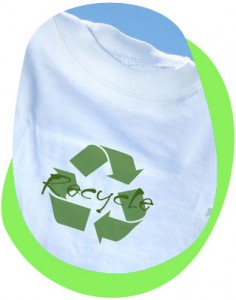 Recycling reduces the demand for raw materials. This means less needs mining, quarrying or logging. Many parts of the world have been blighted by mining and quarrying, which destroy the natural environment and wildlife habitats and may cause environmental and health problems for local people. Also transporting raw materials around the world uses fossil fuels and has an environmental impact. Although some materials for recycling need to be transported around the UK, the impact of this is significantly less than that of transporting raw materials from often remote locations in other parts of the world.
Recycling reduces the demand for raw materials. This means less needs mining, quarrying or logging. Many parts of the world have been blighted by mining and quarrying, which destroy the natural environment and wildlife habitats and may cause environmental and health problems for local people. Also transporting raw materials around the world uses fossil fuels and has an environmental impact. Although some materials for recycling need to be transported around the UK, the impact of this is significantly less than that of transporting raw materials from often remote locations in other parts of the world.
In many cases recycling uses less energy than producing goods from virgin material, and also results in fewer emissions. The manufacture of bags made from recycled rather than virgin polythene reduces energy consumption by two-thirds, produces only a third of the sulphur dioxide and half of the nitrous oxide, uses only one-eighth of the water, and reduces carbon dioxide generation.
What can be recycled?
A great many materials could be recycled but what can be recycled in practice is dependent on economics. Aluminium is worth recycling because it can easily be turned into new aluminium products, and because aluminium is quite expensive. Steel is much cheaper to produce so there is less incentive to recycle it, although it can easily be recycled. This is why there are schemes which give cash for aluminium cans but not for steel ones. The economics of recycling improves if there is a market for goods made with recycled raw materials. So buying recycled promotes recycling.
Other materials are much harder to recycle because the products containing them contain a mixture of materials. A computer may contain several sorts of plastic, various metals, including some which may be toxic such as cadmium, glass and ceramics. Even a soft drinks bottle may contain several sorts of plastic, while a milk carton cannot be recycled as paper because it is lined with plastic or foil.
More and more goods are being marked with symbols which help with recycling by indicating what they are made of and whether they can be recycled. Explanations of these can be found on the Recycle More website.
Local authorities are responsible for waste disposal so always contact your local council first to find out what recycling facilities they offer. Some may make special one-off collections. To find out what your local authority will recycle contact the Recycling Officer – details should be listed in the telephone directory or local authority website. Some local authorities run kerbside recycling services, serving 43% of British households, while others use bring-banks, large skips to which people take recyclable rubbish, and some extract recyclable materials from mixed waste. Steel, for example, can easily be recycled from mixed rubbish because it is magnetic.
Websites run by Recycle More and Wasteconnect enable you to locate your local recycling points. You enter your town or postcode and the sort of waste you want to recycle and they provide brief details of appropriate recycling points. Recycle More provides detailed maps, while Wasteconnect gives more options for specifying your waste.